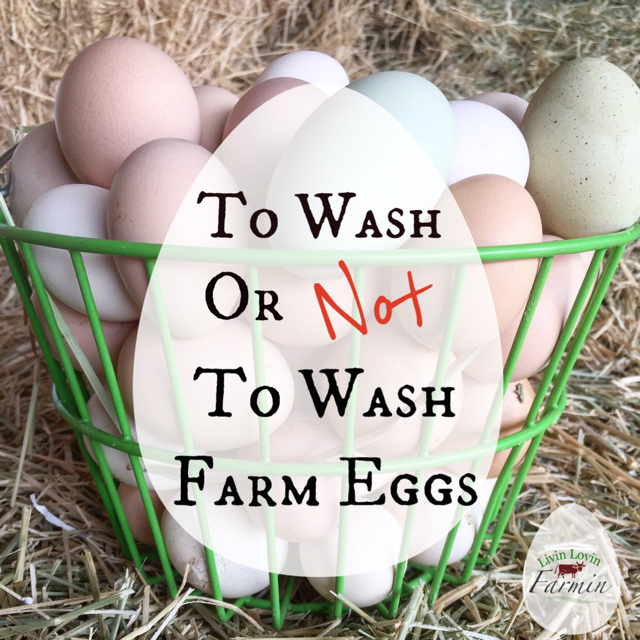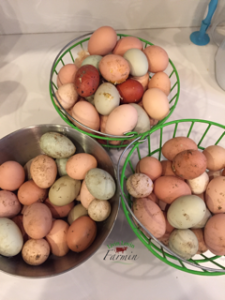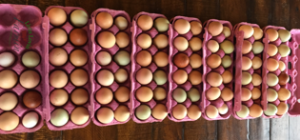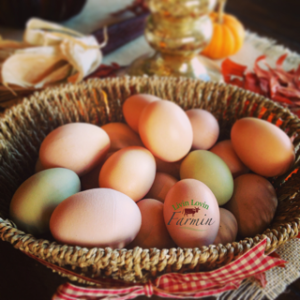To wash or to not wash farm fresh eggs. That is the question.
Growing up we always had fresh eggs. My mom was a nurse and she had several patients that would bring her fresh eggs at each appointment.
I remembering the eggs always had a smokey/wood chippy smell to them. And yes, this is where I admit, that I used to smell dirty eggs shells. Hey, you have to entertain yourself on the farm some how. The eggs were never dirty, but they were never spotless like the ones I’d see in the store. However, ours weren’t white like grocery store eggs either. We always received green eggs.

Several years ago my husband and I took a enchanting vacation to the insanely beautiful Bora Bora. Seriously, its the most beautiful place on earth! When I’m old and grey, you will find me living in a small thatched villa a on a sandy lot.. Anyways.. Every morning, we would walk down the beach to brunch. At the breakfast table they had huge bowls of dirty eggs and I mean dirty, as they awaited their fate on the breakfast table. This was totally normal and perfectly acceptable in their culture. I personally saw nothing wrong with it, like I said, I’ve always had unwashed eggs. However you could tell some guests were put off by this. There was wild chickens everywhere, even pecking the sand around us as we ate. One could only joke and wonder if the chef would pick up random eggs on his way to work every morning. Tahitian markets also store their egg on the floor next to the crackers and canned cheese. 🙂

As Americans, we are one of the only cultures that washes their eggs. And actually, it is illegal in some countries to do so. However, on the contrary, it is illegal for commercial egg farmers in America NOT to wash their eggs. They are required to wash and sanitize them with a chemical solution. So why the polar opposite in food standards? I speculate that it is based upon the commercial poultry housing techniques. ( yes this rant again) Millions of chickens crammed packed into cages, stacked dozens high. The wire growing into their feet and no sun light to be seen. This isn’t healthy for the chickens nor for the consumer, so in return, we end up washing eggs to prevent bacterial contamination such as salmonella and e-coli passing into the vast food supply.
.”.the new regulations by the FDA and USDA on sanitizing require at least a four step process to eliminate all growth of bacteria. Both include in this process a sanitization method of wet washing and rinsing (FSIS.USDA.gov). Yet, these stringent regulations apply only to the commercial industry, which leads the backyard grower to local store without any policies to enforce a proper method of sanitization.” **source
The chicken, like all of Gods creations were actually designed quite perfectly. Unique in its shape and form. And while, it is true that the egg comes out the same “hole” aka, the vent, it actually comes from a separate protected egg shoot, (yes, that’s a technical term) meanwhile it does not touch the cloaca. Think of it as a revolving door, same main exit but different doors to the exit. Upon laying an egg, the hen tucks in the cloaca, like it turning inside, this protect the eggs and keeps it free from fecal matter. As the egg passes through, the pressure from the egg, keeps the cloaca pinched shut. As the egg drops a protective coating called Bloom, coats the egg. If you have ever watched a chicken lay an egg, you will see the wet bloom dry within seconds of being laid. The egg is now protected from bacteria that could possible enter the porous shell.

Sometimes regardless of natures perfection and despite keeping a clean coop, chickens will be chickens and the eggs will get dirty. This especially plays true during the winter and spring muddy months. When the inevitable happens and eggs need to be washed, there are a few steps and precautions to take.
There are several methods to washing eggs. I prefer to dry wash mine, aka, scrap the yuk off. However, wet washing is also used.
Because eggs have the protective bloom coating, try and avoid wetting them whenever possible. THESE kitchen pads are excellent for scratching off the dirt. Be sure to mark them for eggs use only, to avoid cross contamination. If the eggs are spoiled with poo or unsightly mud and washing is necessary, you’ll want to wash the eggs in water warmer then the egg itself, typically around 120º. Because cold water shrinks pores, it opens up a opportunity for bacteria to enter the egg through its porous shell. While some folks prefer to add a dab of bleach the water, I don’t. I am NOT a bleach fan. No way. No how. In my eyes, if an egg is dirty enough that it requires bleach, why eat it? Typically when I get a nasty egg, I will just feed it back to the hens, think of it as recycling. Manna Pro Egg wash is a great resource if you feel the need for a bit more sensitization. When washing eggs, do not submerge them into a sink full of water. Simply rinse or spot wash, being careful not to scrub, as once again, it lends access for bacteria to enter the egg. Another alternative is quick cleaner wipe for your eggs, you can simple make one your self with THIS basic wet wipe recipe or Manna Pro offers a prepacked wet egg toilette. When choosing to wash eggs in a wet solution, it is now advice to store them under refrigeration. Because the bloom has been washed off and bacteria can access the egg, refrigerating the eggs will lower the risk, as bacteria grows slower in a cool controlled environment, then it does at room temperature.
If the eggs are spoiled with poo or unsightly mud and washing is necessary, you’ll want to wash the eggs in water warmer then the egg itself, typically around 120º. Because cold water shrinks pores, it opens up a opportunity for bacteria to enter the egg through its porous shell. While some folks prefer to add a dab of bleach the water, I don’t. I am NOT a bleach fan. No way. No how. In my eyes, if an egg is dirty enough that it requires bleach, why eat it? Typically when I get a nasty egg, I will just feed it back to the hens, think of it as recycling. Manna Pro Egg wash is a great resource if you feel the need for a bit more sensitization. When washing eggs, do not submerge them into a sink full of water. Simply rinse or spot wash, being careful not to scrub, as once again, it lends access for bacteria to enter the egg. Another alternative is quick cleaner wipe for your eggs, you can simple make one your self with THIS basic wet wipe recipe or Manna Pro offers a prepacked wet egg toilette. When choosing to wash eggs in a wet solution, it is now advice to store them under refrigeration. Because the bloom has been washed off and bacteria can access the egg, refrigerating the eggs will lower the risk, as bacteria grows slower in a cool controlled environment, then it does at room temperature.
 If the eggs are spoiled with poo or unsightly mud and washing is necessary, you’ll want to wash the eggs in water warmer then the egg itself, typically around 120º. Because cold water shrinks pores, it opens up a opportunity for bacteria to enter the egg through its porous shell. While some folks prefer to add a dab of bleach the water, I don’t. I am NOT a bleach fan. No way. No how. In my eyes, if an egg is dirty enough that it requires bleach, why eat it? Typically when I get a nasty egg, I will just feed it back to the hens, think of it as recycling. Manna Pro Egg wash is a great resource if you feel the need for a bit more sensitization. When washing eggs, do not submerge them into a sink full of water. Simply rinse or spot wash, being careful not to scrub, as once again, it lends access for bacteria to enter the egg. Another alternative is quick cleaner wipe for your eggs, you can simple make one your self with THIS basic wet wipe recipe or Manna Pro offers a prepacked wet egg toilette. When choosing to wash eggs in a wet solution, it is now advice to store them under refrigeration. Because the bloom has been washed off and bacteria can access the egg, refrigerating the eggs will lower the risk, as bacteria grows slower in a cool controlled environment, then it does at room temperature.
If the eggs are spoiled with poo or unsightly mud and washing is necessary, you’ll want to wash the eggs in water warmer then the egg itself, typically around 120º. Because cold water shrinks pores, it opens up a opportunity for bacteria to enter the egg through its porous shell. While some folks prefer to add a dab of bleach the water, I don’t. I am NOT a bleach fan. No way. No how. In my eyes, if an egg is dirty enough that it requires bleach, why eat it? Typically when I get a nasty egg, I will just feed it back to the hens, think of it as recycling. Manna Pro Egg wash is a great resource if you feel the need for a bit more sensitization. When washing eggs, do not submerge them into a sink full of water. Simply rinse or spot wash, being careful not to scrub, as once again, it lends access for bacteria to enter the egg. Another alternative is quick cleaner wipe for your eggs, you can simple make one your self with THIS basic wet wipe recipe or Manna Pro offers a prepacked wet egg toilette. When choosing to wash eggs in a wet solution, it is now advice to store them under refrigeration. Because the bloom has been washed off and bacteria can access the egg, refrigerating the eggs will lower the risk, as bacteria grows slower in a cool controlled environment, then it does at room temperature. In conclusion, with proper coop hygiene, clean eggs should come easy and cleaning eggs shouldn’t be a regular farm chore.

Livin Lovin Farmin is a participant in the Amazon Services LLC Associates Program, an affiliate advertising program designed to provide a means for sites to earn advertising fees by advertising and linking to Amazon.com.

Great post. We wash our eggs only when necessary and it really grosses out some of our friends. However, in my mind, what a commercial farm does to the eggs is worse! Chemical cleaners? No thanks!
I don’t wash my eggs. If they are soiled they go into a special carton with other soiled eggs and get washed right before use. I like for the bloom to protect the egg as long as possible.
We don’t wash our eggs…luckily are girls are good house keepers..If too dirty husband eats them …win win..
Washing removes the bloom, inviting contamination through that porous shell. It’s tough to find grade B eggs in stores anymore, but the only difference in grade B and grade A eggs is the washing. That and the contamination . Grade A eggs are many many times (I think the number was 60+%) more salmonella. You do the math.